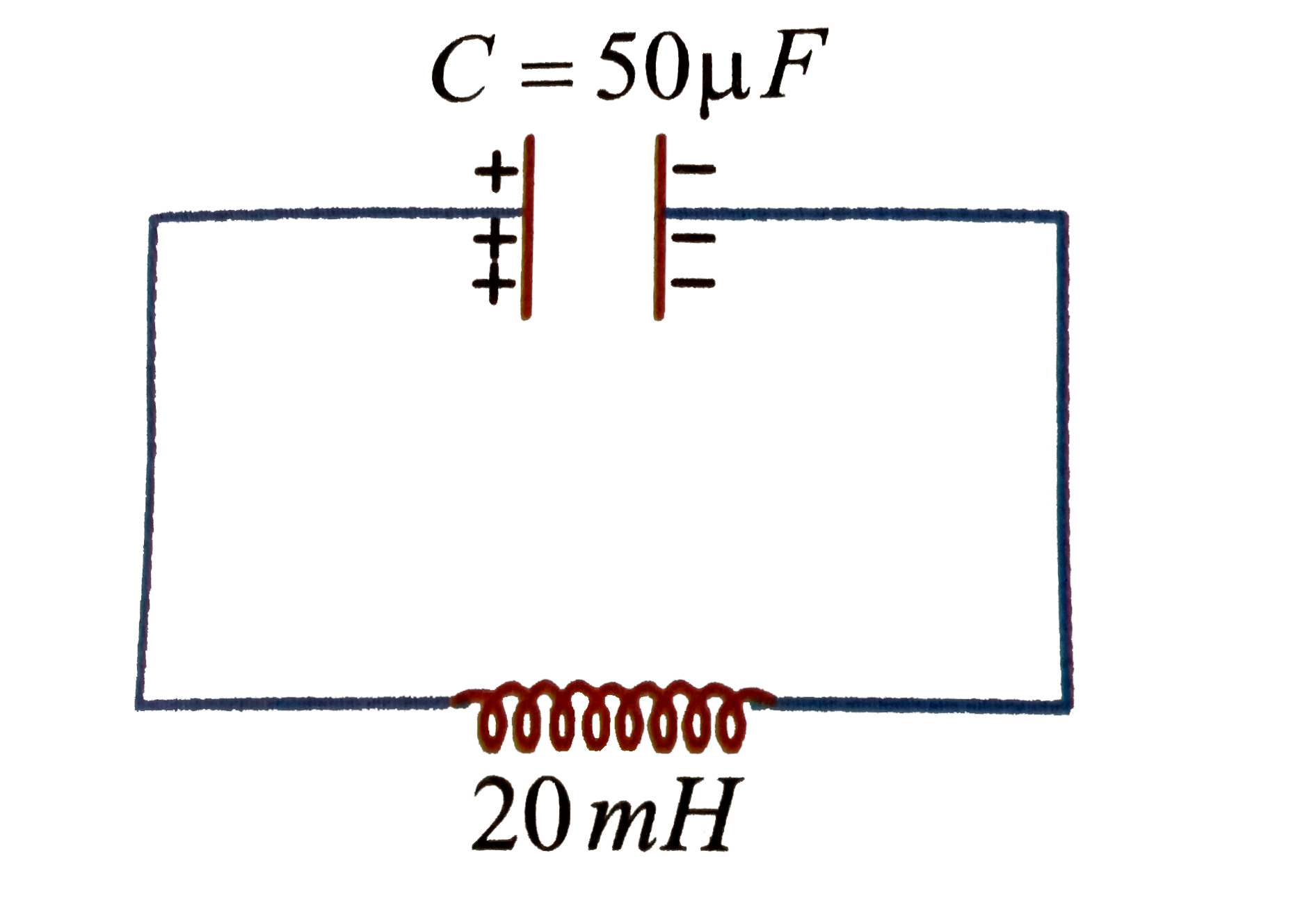An LC circuit contains a 20 mH inductor and a 50 μF capacitor with an initial charge of 10 mC. The resistance of the circuit is negligible. Let the instant the circuit is closed be t = 0.
(a) What is the total energy stored initially? Is it conserved during LC oscillations?
(b) What is the natural frequency of the circuit?
(c) At what time is the energy stored
(i) completely electrical (i.e., stored in the capacitor)? (ii) completely magnetic (i.e., stored in the inductor)?
(d) At what times is the total energy shared equally between the inductor and the capacitor?
(e) If a resistor is inserted in the circuit, how much energy is eventually dissipated as heat?
(a) 1.0 J. Yes, sum of the energies stored in L and C is conserved if R = 0.
(b) ω=103rads−1,v=159Hz
(c ) q=q0cosωt
(i) Energy stored is completely electrical at t=0,T2,T,3T2,……
(ii) Energy stored is completely magnetic (i.e., electrical energy is zero) at t=T4,3T4,5T4......., where T=1v=6.3ms.
(d) At T8,3T8,5T8.........., because q=q0cosωT8=q0cosπ4=q0√2.
Therefore, electrical energy =q22C=12(q202C) which is half the total energy.
R damps out the LC oscillations eventually. The whole of the initial energy (= 1.0 J) is eventually dissipated as heat.
Topper's Solved these Questions
Similar Questions
An LC circuit contains a 20 mH inductor and a 50μF capacitor with an initial charge of 10 mC. The resistance of the circuit is negligible. Let the instant the circuit is closed be t = 0.
(a) What is the total energy stored initially ? Is it conserved during the oscillalions?
(b) What is the natural frequency of the circuit?
(c ) At what time is the energy stored? (i) Completely electrical ? (ii) Completely magnetic ?
(d) At what time is the total energy shared equally between the inductor and the capacitor ?
(e) If a resistor is inserted in the circuit, how much energy is eventually dissipated as heat ?
View SolutionAn LC circuit contains a 20 mH inductor and a 50μF capacitor with an initial charge of 10 mC. The resistance of the circuit is negligible. Let the instant the circuit is closed be t = 0.
(a) What is the total energy stored initially ? Is it conserved during the oscillalions?
(b) What is the natural frequency of the circuit?
(c ) At what time is the energy stored? (i) Completely electrical ? (ii) Completely magnetic ?
(d) At what time is the total energy shared equally between the inductor and the capacitor ?
(e) If a resistor is inserted in the circuit, how much energy is eventually dissipated as heat ?
View Solution
Knowledge Check
An LC circuit contains a 20mH inductor asn a 50μF capacitor with initial change of 10mC. The resistance of the circuit is negligible. Let the instant the circuit is closed be t=0.
 AEnergy stored in the circuit in completely electrical at t=nπ2000BEnergy stored in the circuitin completely magnetic at t=(2n+1)π2000CEnergy stored in the circuit in shared equally between the inductor and capacitor at t=(2n+1)π4000DEnergy stored in the circuit is shared euqally between the inductor and capacitor at t=nπ2000
AEnergy stored in the circuit in completely electrical at t=nπ2000BEnergy stored in the circuitin completely magnetic at t=(2n+1)π2000CEnergy stored in the circuit in shared equally between the inductor and capacitor at t=(2n+1)π4000DEnergy stored in the circuit is shared euqally between the inductor and capacitor at t=nπ2000An LC circuit contains a 20 mH inductor and a 50μF capacitor with an initial charge of 10 mC. The resistance of the circuit is negligible. Let the instant at which the circuit which is closed be t=0. At what time the energy stored is completely magnetic ?
At = 0Bt=1.54msCt=3.14msDt=6.28msAn LC circuit contains a 20 mH inductor and a 50μF capacitor with an initial charge of 10 mC. The resistance of the circuit is negligible. Let the instant at which the circuit which is closed be t=0. At what time the energy stored is completely magnetic ?
At = 0Bt=1.54msCt=3.14msDt=6.28ms
An L–C circuit contains inductor of inductance L and capacitor of capacitance C with an initial charge q0. The resistance of the circuit is negligible. Let the instant the circuit is closed be t = 0.
(i) What is the total energy stored initially?
View SolutionAn L-C circuit contains 20 mH inductor and a 50μF capacitor with an initial charge of 10 mC. The resistance of the circuit is negligible. Let the instant the circuit is closed be t = 0. what is the total energy stored initially ? At what times is the total energy shared equally between the inductor and the capacitor ?
View SolutionAn L-C circuit contains 20 mH inductor and a 50μF capacitor with an initial charge of 10 mC. The resistance of the circuit is negligible. Let the instant the circuit is closed be t = 0. what is the total energy stored initially ? At what times is the total energy shared equally between the inductor and the capacitor ?
View SolutionAn LC circuit contains a 20 mH inductor and 25μF capacitor with an initial charge of 5 mC. The total energy stored in the circuit initially is
View SolutionAn LC circuit contains a 20 mH inductor and 25μF capacitor with an initial charge of 5 mC. The total energy stored in the circuit initially is
View Solution

